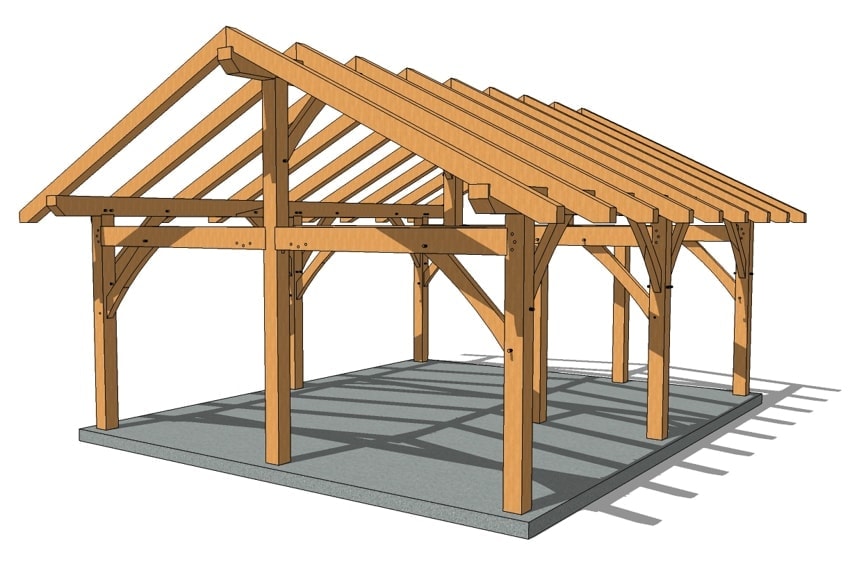
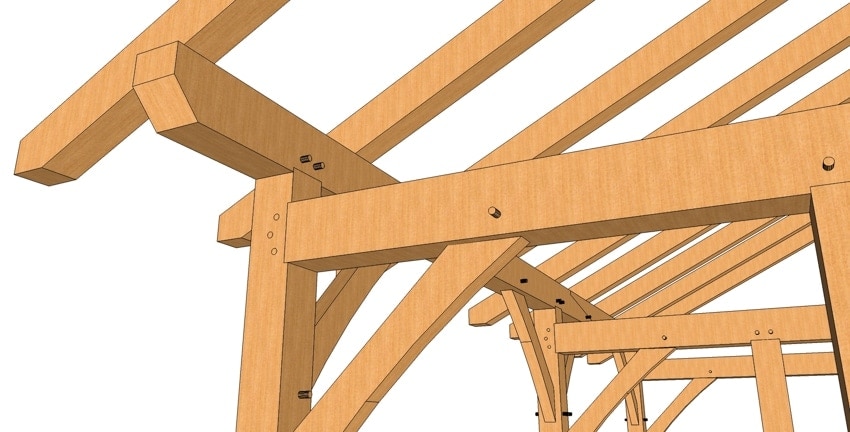
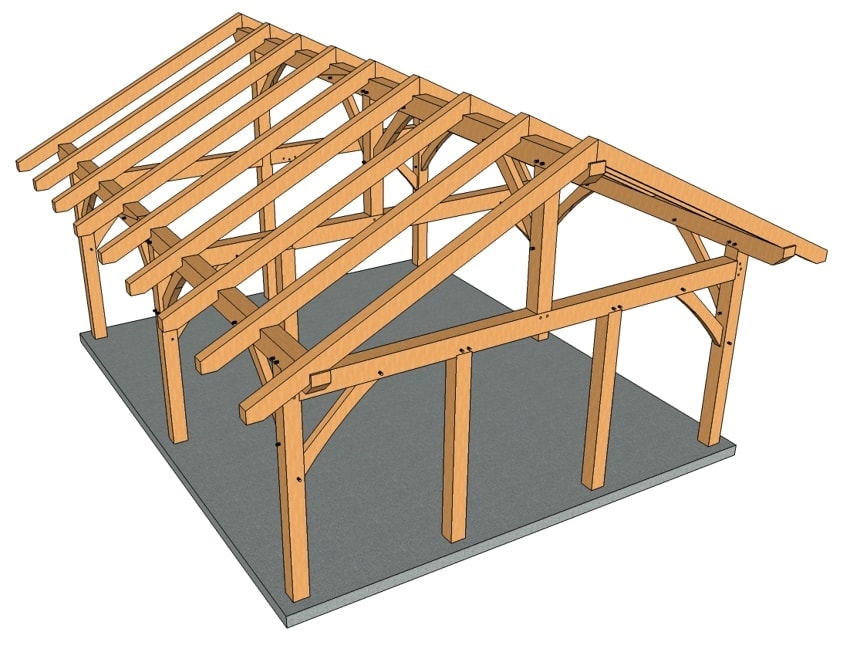
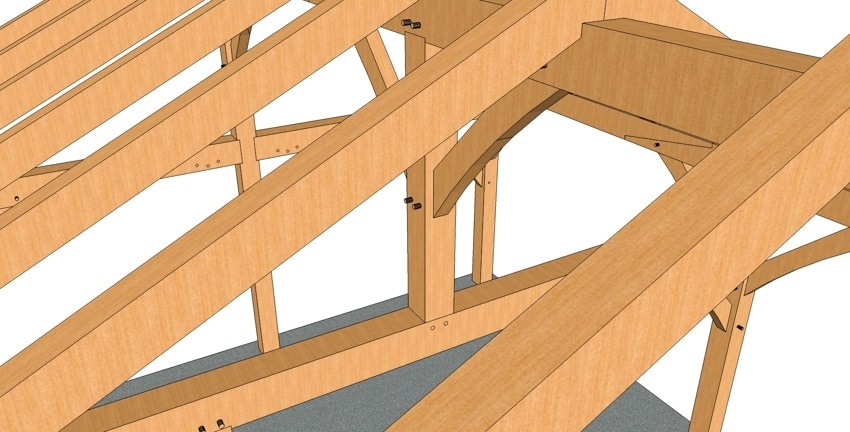
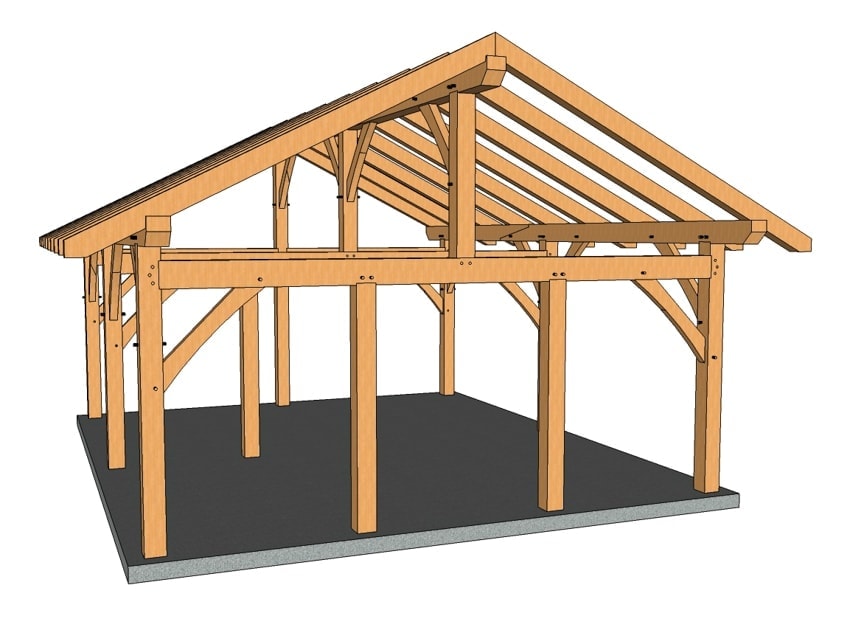

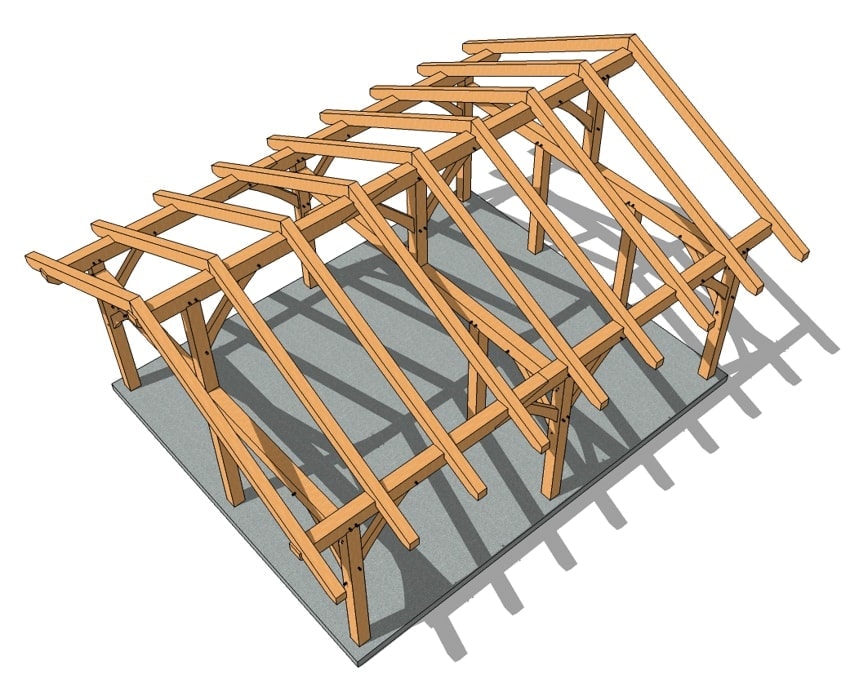
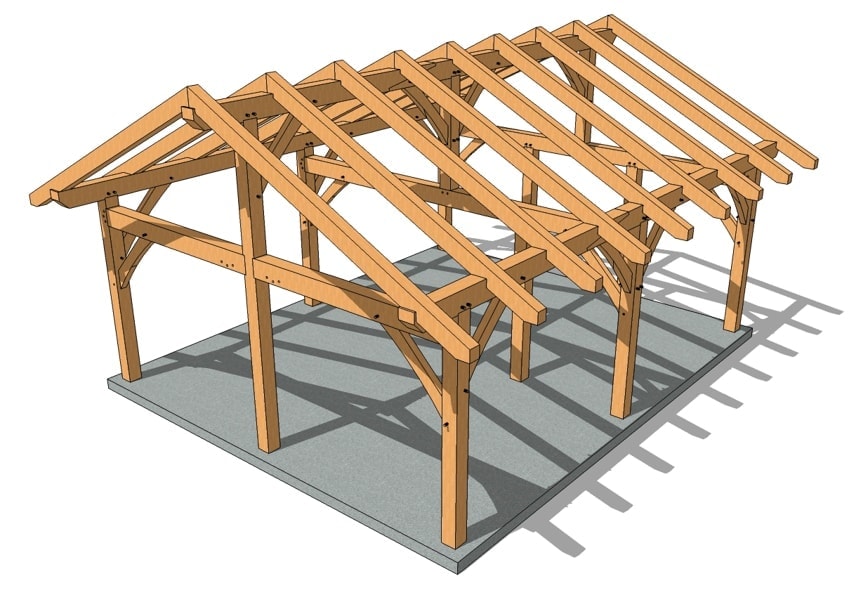
Whether you need a two-bay garage, a guest house, or a spacious workshop, the 20x24 Heavy Timber Outbuilding delivers versatility, beauty, and enduring strength. Featuring classic king post trusses and handcrafted joinery, this structure blends function with architectural character.
Design Highlights:
- Footprint: 20' x 24' (480 sq ft between the posts)
- Ceiling Volume:
- Plate height over 9 feet
- Ridge height well over 13 feet (with a standard 6:12 pitch)
- Roof Pitch Options: Drawings included for 3:12 to 12:12 pitches to customize ceiling volume and exterior appearance
- Joinery Details:
- Gracefully curved king post trusses and knee braces
- Spline joinery in beams and scarf joints in plates for traditional strength and beauty
- Heavy Timber: Sturdy posts and trusses built to last for generations
Flexible Uses:
- Two-Bay Garage
- Guest House or Tiny Home
- Workshop or Studio
- Outdoor Pavilion or Event Space
Depending on the roof pitch you choose, there’s enough headroom to add a loft for storage or a sleeping nook—or enjoy the full volume of the high ceilings by keeping the space open.
Buy This Plan
This plan provides detailed, easy-to-follow blueprints, perfect for anyone building their own timber frame.
Customize or Kit
Do you like this plan but need to change it a little, or do you want a complete Ready-To-Raise Kit?
Get An Instant Quote
Use our online calculator to get a quote for a complete Ready-To-Raise™ Kit. Just need your zip code.
View Our Interactive 3d Model
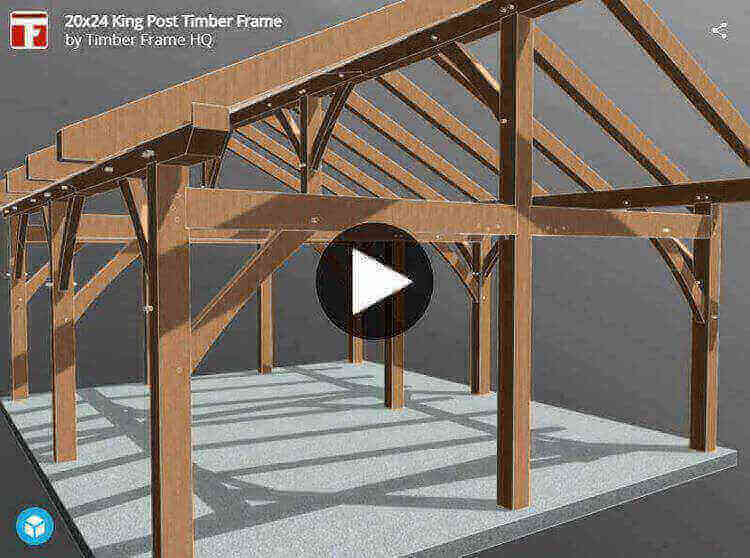
We understand that every project is unique, so we offer extensive customization options for our plans and kits. Choose from various sizes, roof styles, and finishes to match your style and landscape. Our design team is dedicated to helping you create the perfect plan that reflects your vision.
Here's How You Can Get Started:
- Phone: Call us at 888-552-9379 (9–5, M–F) to speak with one of our experts.
- Email: Send your questions to projects@timberframehq.com, and we will respond within two business days
- Online Form: Please complete the form below, and we will respond promptly.
I live in mid-Missouri. Tornadoes are the worst physical event for us. Wind is the greatest risk. Will SIPs help with stability?
Understanding that plan users are infinitely variable in their application and implementation of this frame, what is a reasonable estimate for what is entailed for just the timbers involved?
I will cut and erect myself. Probably on a poured concrete foundation and floor, with under floor plumbing access and safe room. SIP walls and roof with metal skin on roof. 9/12 pitch.
Spacious floorplan with guest bedrooms and a full bath on second floor for visitors and grandkids.
If I like it I will build two. I have three daughters. Some separation is good 🙂
Yes, SIPs will help out a great deal, talk to your SIP company about the fastener schedule, adding more screws will be a big help. If you are working full time by yourself and are reasonably efficient with material handling I would give yourself 3 months if not 4. Can it be done faster, yes, but I tend to be conservative with time estimates?
Hi Brice,
Whats the longest timber length on this design?
Kevin, the longest timbers are the bent girts and the plates/ridges. They are 8x10x22 feet. We call for the timbers to be a bit longer than actually required to allow for checking, etc.
Do you have a list of timber sizes and number used? Looking to gather my own logs and mill them.
Hi – can I ask why there is a scarf joint above the brace rather than the main post?
I would be interested in this plan if the roof pitch allows for a loft (bedroom)
Cheers,
It is better for the scarf joint not to be above a post. Here is why between the posts the unsupported timber will sag or deflect. Over the center post, the timber will crown.
This causes this “exaggerated” wave shape effect in the timber. At the point where the sag or deflection changes to a crown is called the point of “inflection”.
This point is where the timber is neither sagging nor crowning. It has the least amount of both forces, that happens to be over the brace.
The plans come with all the roof pitch drawings from 3/12 to 12/12 and adding a loft is as easy adding to loft timbers. Let us know we can help sort out the loft.
With that said, if you timber length dot allow it you can put it above a post…I am staring at one in my office as I type this.
Does the plan show the snow load in the specs? The county planning office won’t issue a permit without this information
The plans do not have those specs on them. Those specs will change from frame to frame depending on timber grade and species.
Hey Brice,
I’m looking at this plan for a shop. I can add another bent to get the length I need but county planning calls for a minimum of a 56lb snow load. I will be using yellow and ponderosa pine milled from my lot and I’m thinking of the 6/12 pitch to shorten the length of the rafters (and the size of the timbers I will need to source).
That being said I would also need the snow loads in writing to satisfy the planning people.
Will you provide AutoCad files for drawings or only PDF’s?
We generally only provide pdfs. We actually do not have Autocad files for this plan. Thank you for asking!
Could the overhangs be extended to 3 foot?
Yes, Gary, you can extend the overhang. It just loses some ground clearance the farther you go out.
Brice
Silly question other than pure weight is there any reason not to use full lengths for the ridge beams and skip the scarf joint totally
Thanks Dale
Brice
Can the post that is offset on the inside of the building by simply switched to the other side it would work much better for my layout
Yes, there is no problem moving that post around to fit your project.
If I used 3 taller beams across the pavilion, would I still have to use the posts in the middle of all 3 beams?
In the 24′ direction or the 20′ direction?
The 20 foot direction
What I’m asking is, could this layout have an open center standing on 6 posts
Yes, it is possible, however, half of the total roof area load comes down the king post and bears on the 20′ tiebeam. The center alone tie beam takes 25% of the total roof load. So it is vital to have an engineer review the tiebeam size before making that modification.
Is the middle post really needed, it would be nice to have an open floor plan?
Looking for something this size and look to tie into the back of my garage, 12 foot roof peak.
Yes, the middle post is needed. However, these two plans are designed without a center post: 24×36 King Post Truss Pavilion and 26×36 Timber Frame Carport
This is an amazing website and very helpful. This 20×24 King Post Timber Frame is perfectly size for my project. Before I make the next step I have a dilemma between this one with increased roof pitch drawings to 9 in 12 or even closer to 12 in 12 to get some loft space and https://timberframehq.com/20×24-queen-post-plan-with-loft/ .
Many thanks in advance for all your help.